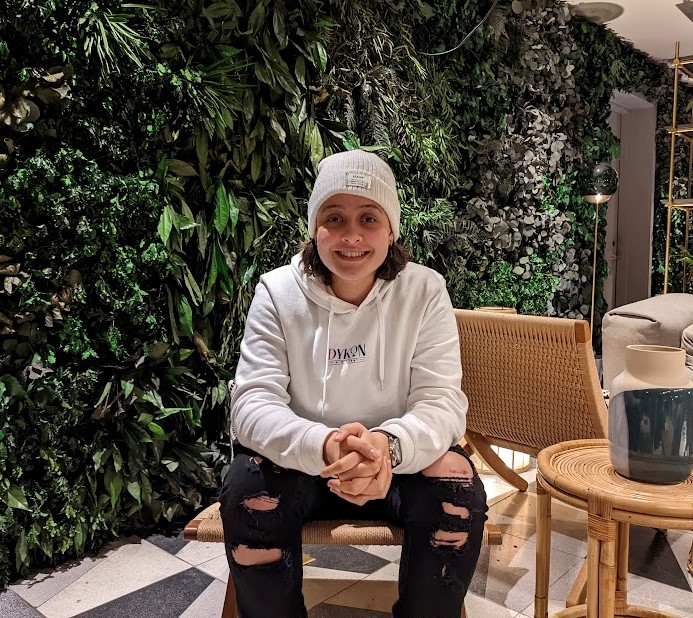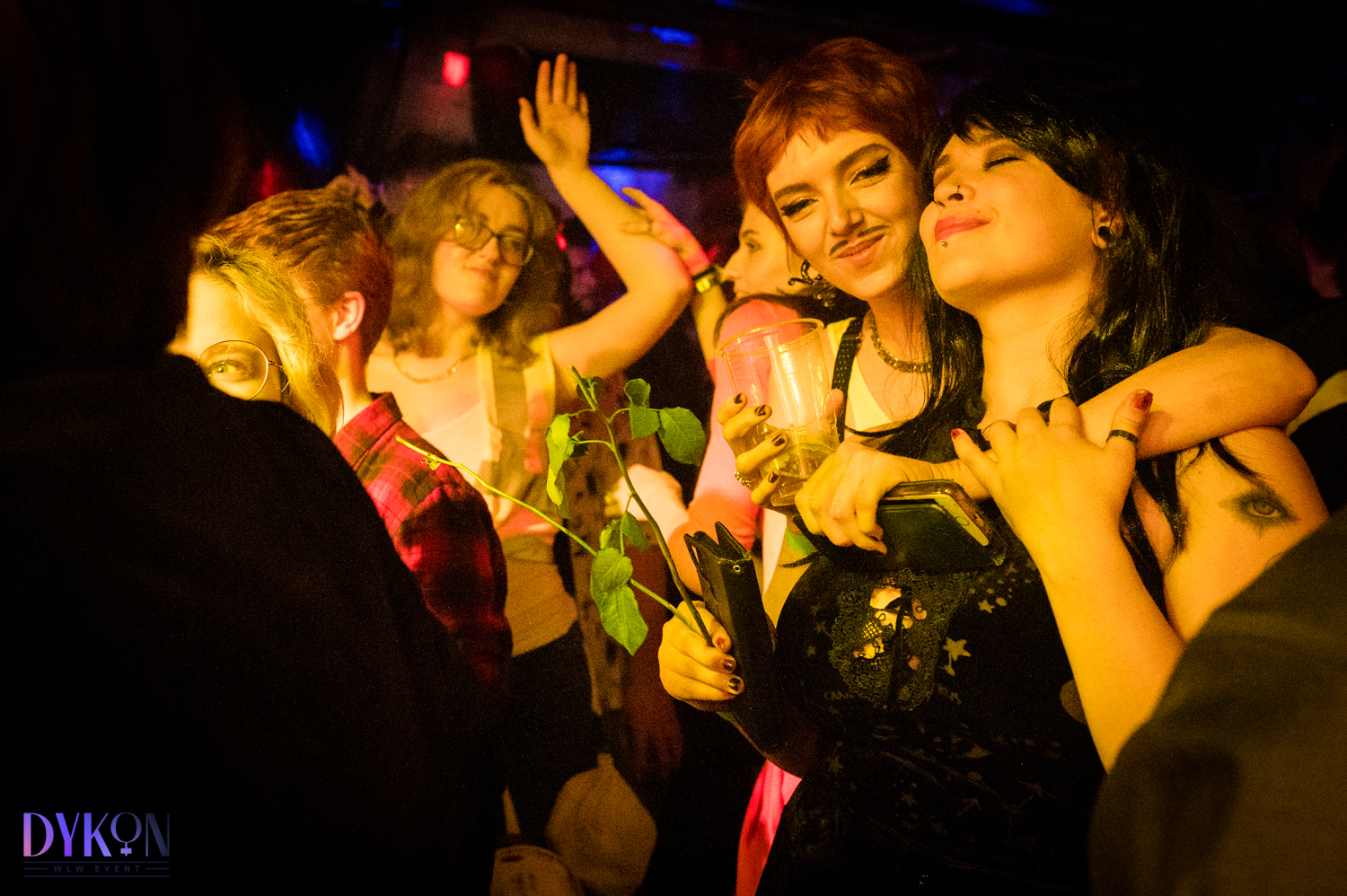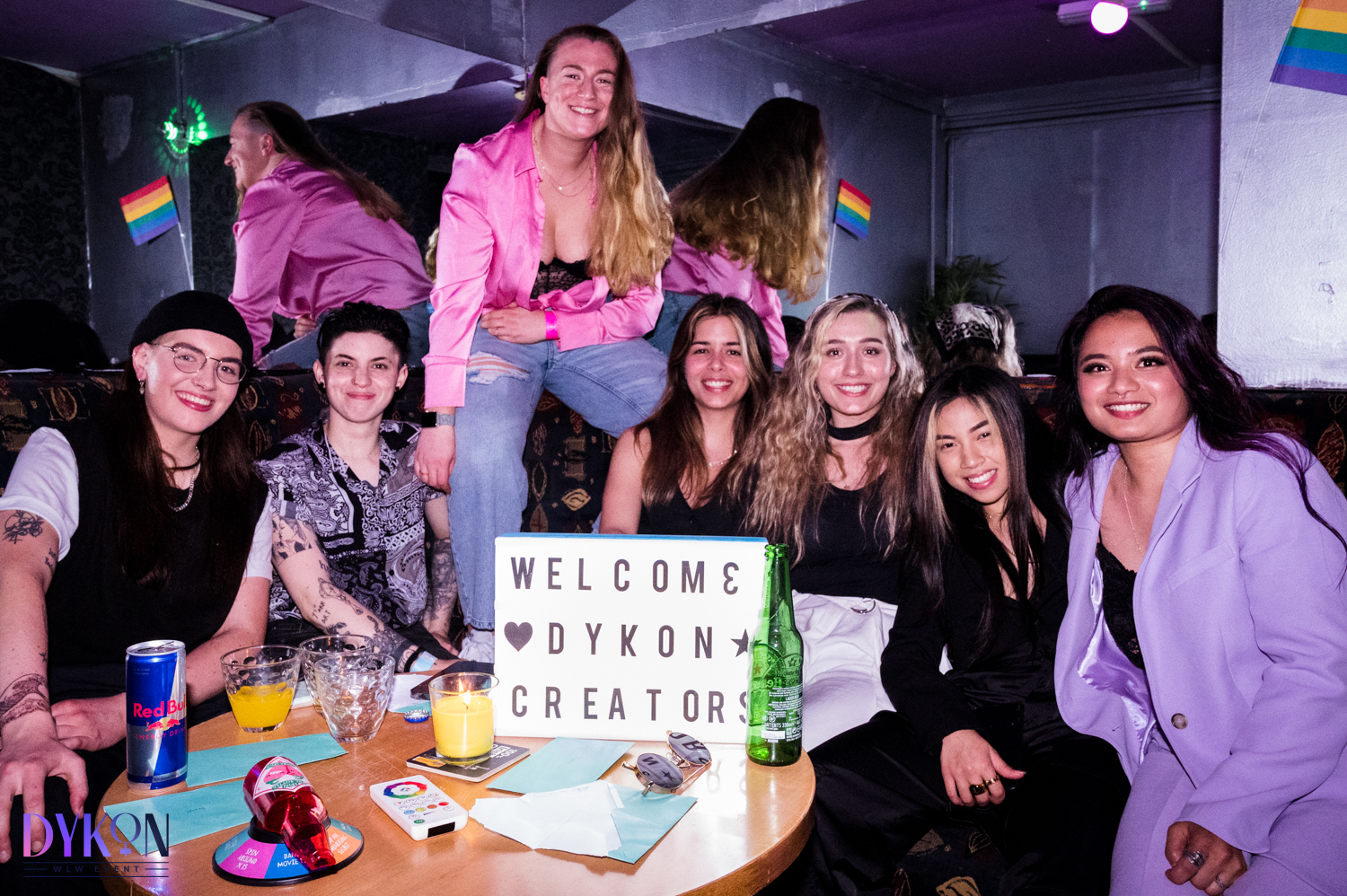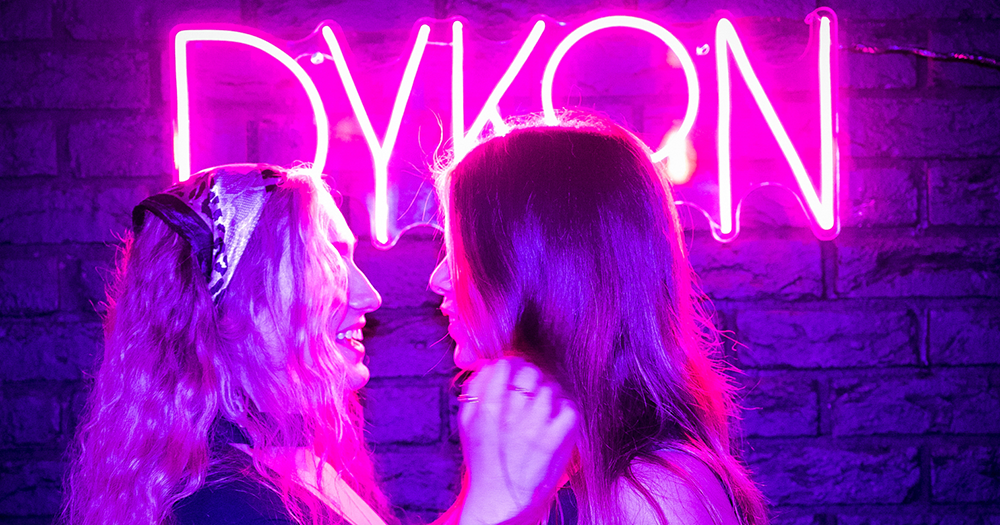Many queer people have been banished from their families, communities, and countries, for one reason – who they were born to love. As it is difficult to reconcile such complex divisions, projects like Mafalda Hrušková’s Dykon, attempt to start small by creating spaces where these people can feel safe, for example on a night out.
Queerness as entertainment
Picture this: it’s a Friday night, you and your partner are dancing away in the depths of a stuffy city centre club. Occasionally blinded by the laser beams emerging from a cloud of artificial fog, your bodies lean closer for a quick kiss. No one around you bats an eye.
For many members of the queer community, their reality is in stark contrast to this idyllic experience. If the other club-goers don’t demand the couples to kiss in an attempt to play out their own sexual fantasies, they subject them to various forms of verbal or physical abuse.
“From the interactions that I’ve had, it often seems like straight people almost expect queer people to be there for their entertainment,” explains Mafalda Hrušková (25). She is the woman behind Dykon, a series of nightclub events providing entertainment to women and queer people in Ireland.
“I’d like people to understand that we’re not queer for anyone else, but because it’s how we are,” she adds.

Mother of Dykon
Mafalda, nicknamed ‘Mafi’, was born in Portugal to a Slovak father and Portuguese-Angolan mother. With her father being a Colonel employed abroad as a Defence Attaché of the Slovak Republic, Mafi’s family lived in various European countries. When she was a teenager, the Hruška family moved back to Slovakia, where they have remained until this day.
However, six years ago, Mafi moved to Cork to pursue a degree in criminology, to which she later added a business master’s degree. But the quality of Irish higher-level education wasn’t the only reason behind her departure from Slovakia.
“Part of the reason why I’m out of Slovakia (is that) it doesn’t feel safe,” Mafi explains. In addition to some of her closest family members bein unwilling to accept her sexual orientation, Slovakia’s ongoing intolerance towards the LGBTQ+ community, in general, played a big role.
Just two months ago, a 19-year-old son of a right-wing politician shot two gay men dead outside a popular queer bar in the country’s capital city of Bratislava. The incident, which left the local LGBTQ+ community in fear for their lives, was later re-classified as a terrorist attack.
Enjoyment in a safe space
Knowing what it feels like to be threatened for one’s sexual orientation, Mafi felt in need of a refuge which was absent in Ireland. Inspired by the US and the UK, she created Dykon – a series of social gatherings geared towards queer women and non-binary people with the aim of providing a safe space for them.
“I just decided that if no one else was doing it, I might as well be the one to do it…(Dykon) allows them to be themselves and not have to worry about who is watching or the safety of the space that they’re in,” she explains.

So far, Mafi has organised three events, two in Cork and one in Dublin. As well as dancing and enjoying club music, the attendees are invited to partake in stage games and watch the performances of queer artists and content creators.
One musician invited to showcase their work for a room of queer party-goes was Laura Keane, a multi-instrumentalist and singer known as ELKAE. The first Dublin Dykon instantly became one of her favourite shows.
“I felt so accepted and at home,” she said. “The music I write is about my experience as a woman and often about my experience with other women, navigating queer relationships and life from that point of view… This audience is who my songs are for, and I really felt that energy when I was up there!”
On a personal level, Laura feels that events like Dykon are extremely important. “You never know what kind of homes or backgrounds people are coming from, or even what kind of experiences they’re having when they leave the house as a queer/non-binary person. It can be rough out there.”
What such projects give to the community is “a place they can feel accepted and express themselves freely without the worry of judgement or harassment,” says Laura. “It’s a total safe space!”
People who make and break Dykon
With each event, the number of attendees has grown, and the venue size has gotten larger. While the response to Dykon has been overwhelmingly positive, as the post-event surveys suggest, the project has received some negative attention online:
“A lot of men state that they will come to infiltrate the space, which, I think, speaks to the whole reason of why we need a safe space in the first place and why it was created,” says Mafi, adding that she routinely books security service for the day.
“Their sort of instinct is ‘oh, there is a space that’s not for us, how can we infiltrate it?’ which is upsetting.”
However, these online threats have so far never transformed into physical danger.
On the other hand, forming ties with local influencers and online personalities has turned out to be an important contributor to Dykon’s success.
“I reached out to a lot of queer creators that I watched and liked…and invited them to Dykon in exchange for them creating some content,” Mafi explains.
Mafi’s business strategy soon turned into a personal affair. “I feel like I’ve created some good friends amongst the creator community. Having them supporting Dykon…but even more importantly, supporting me personally, is a huge push and it really makes me excited for what’s to come.”

Future of Dykon
The fourth and biggest event yet, themed ‘MasQueerade’, is due to take place in Dublin’s Opium on January 21. Compared to the more intimate, performance-focused nights in Cork, the upcoming gig will mainly please partygoers and dance music lovers, with two DJs already confirmed.
“I feel like people in Dublin just want to come dance and enjoy themselves, so it’s going to be a bit different,” teases Mafi.
Although Dykon has proven to be a successful series of nightclub-like events, Mafi wishes to elevate it into an initiative that would have a long-lasting effect on the local queer people.
“I know people go there to have fun and dance, but I do hope that in the future we can create a bit more of a community around Dykon, so the people who are new to the community feel like they have somewhere to go, even an online place to go, where they can support each other.”
Whether Mafi’s wish comes true or not, she has already made a difference. Laura says that Mafi is “absolutely fantastic, she works so hard, and she just cares so much! I hope she knows what an amazing job she’s doing for the queer community in Ireland.”
Tickets for the next Dykon on January 21 are on sale, grab yours here!
© 2023 GCN (Gay Community News). All rights reserved.
Support GCN
GCN is a free, vital resource for Ireland’s LGBTQ+ community since 1988.
GCN is a trading name of National LGBT Federation CLG, a registered charity - Charity Number: 20034580.
GCN relies on the generous support of the community and allies to sustain the crucial work that we do. Producing GCN is costly, and, in an industry which has been hugely impacted by rising costs, we need your support to help sustain and grow this vital resource.
Supporting GCN for as little as €1.99 per month will help us continue our work as Ireland’s free, independent LGBTQ+ media.
